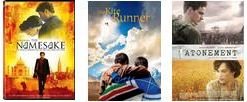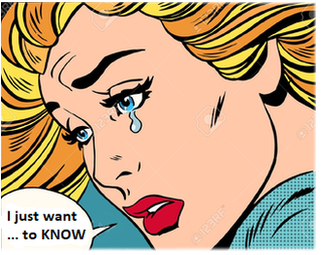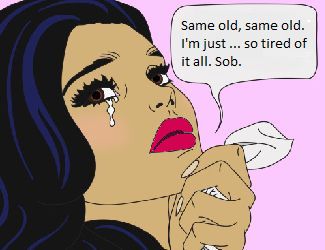 Another book? Philip Roth is 75! Why doesn’t he schlep himself off to Florida, put his feet up, and collect his royalties?
Another book? Philip Roth is 75! Why doesn’t he schlep himself off to Florida, put his feet up, and collect his royalties?
It would be the decent thing to do—it’s what the rest of us would do.
Noooooo...... he’s still plugging away, churning out one superb book after another. His latest is Indignation. “Enough already,” as Portnoy’s mother would say.
I’ve come to Roth late, and now I’m wondering why I deprived myself for so long. If you haven’t read him, run to the nearest library or bookstore. Yes, he can be long-winded, over-the-top, tasteless, and self-absorbed, but he’s also brilliantly inventive, side-splittingly funny, and a dazzling storytelller. Oh, and sexually explicit (hilariously explicit, if you’re up for that...if you’re not, please beware).
Where to start? I can’t direct you, but here’s an outline of his oeuvre:
Philip Roth
- Portnoy’s Complaint—a Jewish man-child’s coming-of-age. (The funniest book ever written.)
- The “Zuckerman novels”—9 in all. In the first 4 (referred to as “Zuckerman Bound”) Nathan Zuckerman, author of the outrageous Carnovsky and stand-in for Roth and Portnoy’s Complaint, is the protagonist. In the last 5, an older Zuckerman observes more than participates in the stories he tells.
- The “Kepesh trilogy”—3 novels that revolve around David Kepesh, an insecure and sexually fixated literature professor.
- The “Roth novels”—3 semi-autiobiographical (or not) novels.
- Other novels—another 9—include Goodbye, Columbus; Letting Go; When She Was Good; Our Gang; The Great American Novel; My Life As a Man; Sabbath’s Theater; Everyman; and the most recent, Indignation.
- Oh, yes—another novel is in the works, The Humbling, due out in 2009.
- Non-fiction and short stories—had I mentioned that?
Also head to SCREEN THOUGHTS with Hollister and O'Toole to listen to the podcast review of the 2016 Sundance film version of, Indignation. (The review starts at point 11:04 after a tribute to famed writer-director-producer Garry Marshall.)
Where do critics stand? He’s been called “the single best writer of fiction of the past 25 years.” * And while all critics have their Roth favorites, most seem to agree that the following are his best (click on titles to see our Reading Guides):
- Portnoy’s Complaint (1969)
- Zuckerman Bound (1979-85)
- Operation Shylock (1993) – Roth Novel
- American Pastoral (1997) – Zuckerman Novel
- The Human Stain (2000) – Zuckerman Novel
- The Plot Against America (2004) – Roth Novel
- Sabbath’s Theater (2005)
- Everyman (2006)
- Exit Ghost (2007) – Zuckerman Novel
* A.O. Scott. “In Search of the Best.” New York Times Book Review , 5/21/2006.
 My 3rd post* on Josh Henkin’s excellent essay about book clubs. Henkin (author of Matrimony) speaks with book groups all over the country, and here’s what he would like to see happen when we talk about books:
My 3rd post* on Josh Henkin’s excellent essay about book clubs. Henkin (author of Matrimony) speaks with book groups all over the country, and here’s what he would like to see happen when we talk about books:
- Less discussion about which characters are likable: (Think of all the great literature populated by unlikable characters.)
- Less of a wish for happy endings: (Nothing is more depressing than a happy ending that feels tacked on, and there can be great comfort in literature that doesn’t admit to easy solutions, just as our lives don’t.)
- Less of a wish that novels make arguments: (The business of the novelist is to tell a story and to make characters come sufficiently to life that they feel as real to the reader as the actual people in their lives.)
Books on the Brain, April, 29, 2008
Dear reader, we’re up a creek. Henkin’s points are well-taken, but since we’re not professional critics, and if we shouldn’t talk about characters, endings, or themes—then what do we talk about when talking about books, especially when it’s our turn to lead the discussion? (Me? Lead the discussion? Please, I’d rather have the flu.)
If it’s high anxiety for you at your book club—give the discussion resources a try on our main website. You may find they help.
• Reading Guides for specific titles and discussion questions.
• Discussion Tips
• Generic Questions for Fiction and Nonfiction
• Read-Think-Talk —a guided-reading chart.
• LitCourse—our 10 short, free online courses.
See all my posts on Josh Henkin’s book club essay:
 Back to Joshua Henkin—this is my 2nd post devoted to his terrific essay about book clubs. Henkin, author of Matrimony (now in paperback), speaks with book groups around the country. Here’s a question he raises:
Back to Joshua Henkin—this is my 2nd post devoted to his terrific essay about book clubs. Henkin, author of Matrimony (now in paperback), speaks with book groups around the country. Here’s a question he raises:
Where are all the men? . . . My experience has been that women read fiction and men read biographies of civil war heroes. And women join book groups and men don’t. Yet those few co-ed book groups I’ve attended have been among the most interesting. And if, as seems to be the case, book groups have led to an increase in reading in a culture that otherwise is reading less and less, it would be nice to see more men get in on the act.
Books on the Brain, April 29, 2008
Henkin is right: I read somewhere that 75-80% of book clubbers are women—why is that figure so lopsided? Why do women join book clubs and men don't? And for those few co-ed clubs to which Henkin refers, are the reading lists different from all-women clubs? (See my later post on this very subject—Do Real men join book clubs?—11/7/08.)
Questions for Book Clubs
1. For women’s clubs: do you ever consider inviting men to join your club?
2. How do you think adding men might change your book choices and discussions?
3. Same questions for all-men clubs, too. I know there are a few all-male clubs out there.
See my three other posts based on Joshua Henkin’s book club essay:
1. Book Clubs—smarter than critics?
2. I Laughed! I Cried! — how do we talk about books?
3. Echo Chambers—are we all reading the same books?
 Am I the only person in the US who hasn’t seen Mama Mia? Probably. I’m so late on the uptake. Worse, yesterday I finally got around to seeing The Namesake, based on Jhumpa Lahiri’s novel. Better late than never.
Am I the only person in the US who hasn’t seen Mama Mia? Probably. I’m so late on the uptake. Worse, yesterday I finally got around to seeing The Namesake, based on Jhumpa Lahiri’s novel. Better late than never.
Sometimes a movie is just better than its book. I liked Lahairi’s novel. But I think (at least for now) she’s a better writer of short stories, which is actually a harder craft. (Faulkner claimed short stories to be more difficult than poetry.)
Namesake, The Film is terrific. By nature, it lacks the book’s interiority (and therefore some of its depth and insights), but that may be why I liked the movie’s characters better, particularly Gogol, who isn’t as alienated or self-absorbed as he is in the novel. Granted, the movie doesn’t capture Ashima Ganguli’s isloation from American culture as well as the book, nor her dismay at losing her children to its influence. But I just think the film holds together better. (See our Reading Guide for The Namesake.)
On the to The Kite Runner. Beloved as the book is, it has some structural problems, especially toward the end when Ahmed meets his nemisis 15 years later in Afghanistan. That whole section felt tacked on, manipulative, over-the-top. Again, the film version was better, somehow managing to handle the rescue section with more elegance and power. Same with the final kite flying scene on the California beach. (See our Reading Guide for The Kite Runner.)
And finally Atonement. Wow to both book and film. But I like the film’s ending better than the book’s. The whole birthday party scene (with Briony’s secretiveness about her to-be-published-book and the bad buys sitting right there) feels contrived. But Vanessa Redgrave’s beautifully modulated monologue somehow lent the film more credibility and power, to say nothing of stature. It took my breath away. (See our Reading Guide for Atonement.)
Book Club Questions
- What books have you read that also have film versions? Which did you prefer?
- Does your club show film clips during discussions? Do you talk about a book vs. film version?
 An intriguing blog post by Joshua Henkin, author of Matrimony, raises some interesting issues about book clubs. I’m using only a brief excerpt here, but there’s so much more to his article that I plan to refer to it in future posts.
An intriguing blog post by Joshua Henkin, author of Matrimony, raises some interesting issues about book clubs. I’m using only a brief excerpt here, but there’s so much more to his article that I plan to refer to it in future posts.
Henkin speaks with book clubs around the country, and here’s what he says about the many clubs he’s talked with:
From coast to coast and in between, I’ve found a huge number of careful readers . . . who have noticed things about my novel that I myself hadn’t noticed, who have asked me questions that challenge me, and who have helped me think about my novel (and the next novel I’m working on) in ways that are immensely helpful. I’ve certainly learned more from book groups than from the critics, not because book group members are smarter than the critics (though often they are!), but because . . . they bring to the enterprise a great degree of passion. —Books on the Brain, April 28, 2008.
Be still my heart! Henkin’s experience refutes a disheartening blog discussion I came across a while back. The blogger and her guest were disparaging Oprah and her book selections, as well as the entire book club movement—because they didn’t meet certain standards of literary sophistication (apparently, their standards). Ouch.
Well, I love Josh Henkin’s remarks—they certainly put that ugly assertion to rest. Yea, Josh!!
See my later posts on Joshua Henkin’s book club essay:
 Has your book club read any chick-lit? If so, is there enough meat, or gum, for a good discussion?
Has your book club read any chick-lit? If so, is there enough meat, or gum, for a good discussion?
What is chick-lit? Think young urban women obsessed with men, sex, possessions, travel, and partying. Think Sex in the City, All We Ever Wanted Was Everything, or Chasing Harry Winston.
The title of a recent New York Times article, “On the Beach, Under a Tiffany Blue Sky,” situates chick-lit smack in the middle of a beach towel—as escapist summer reading.
Beach reading or not, you can imagine older feminists yanking at the bottoms of their bathing suits in disdain. Is this what all the fuss was about—so daughters could end up as boy-crazy, status-seeking materialists?
But maybe chick-lit is more serious? Maybe it’s a reaction against the earnestness of the previous generation. Here’s author Melissa Banks in a 1999 Salon interview:
The women of my [younger] generation were brought up to think of themselves in terms of what they did rather than of being married or unmarried, and it took on this huge weight. Work was suddenly supposed to be a much bigger thing than work can ever be. You’re supposed to give your soul to it—and ... to be as dedicated to your work as you would be to another person.
Questions for book clubs:
- Is chick-lit a rebellion: “not-your-mother’s-feminism”? Or is it a second-generation taunt at men: ”Anything-you-can-do-I-can-do-better”? (If men can take charge of their own sexuality, careers, dreams and desires, why can’t women?)
- Should chick-lit be taken with a grain of salt (or sand)? Or does it offer an interesting insight into a post-feminist era.
 A book review this summer got me to thinking about the differences between male and female authors—whether men and women write differently...and whether book clubs prefer one gender over another.
A book review this summer got me to thinking about the differences between male and female authors—whether men and women write differently...and whether book clubs prefer one gender over another.
Here’s Liesl Schillinger on Atmospheric Disturbances, a new work by Rivka Galchen:
It’s unusual—in fact, (why be coy?), it’s extremely rare—to come across a first novel by a woman writer . . . in which the heart and the brain vie for the role of protagonist, and the brain wins. While the voice and mood of the novel are masculine, clinical and objective . . . the book’s descriptions of colors, smells, clothing and bodies show feminine perception.
—New York Times Book Review, 7/13/08
My favorite part of that quote is “why be coy?”—an implicit acknowledgement that what follows is going to shake up some shibboleths. But do men and women write differently?
This is hard for me to acknowledge, but I think Schillinger is right. Works like Absurdistan, The Brief Wondrous LIfe of Oscar Wao, The Road, even The Corrections seem to display a distinct masculine sensibility. Reading them, I’m decidedly aware they were penned by a male. And there are books written by women that I feel are distinctly feminine: authors like Jody Picoult, Sue Miller, Sarah Gruen, Sarah Addison Allen. But that, I think, is a subject for another blog entirely.
Questions for Book Clubs
- Do women clubs read “masculine” works like Absurdistan, Oscar Wao, or The Road? And do men read books that have Schillinger’s feminine perception—say Interpreter of Maladies or The Memory Keeper’s Daughter or The Secret Life of Bees?
- Overall, do masculine works like The Road or The Corrections get taken more seriously than feminine works? Or does NONE of it matter.
 Writer Joe Queenan thought he might earn a few extra bucks by trying his hand at writing some discussion questions—the ones publishers issue for book clubs. (See our Reading Guides.)
Writer Joe Queenan thought he might earn a few extra bucks by trying his hand at writing some discussion questions—the ones publishers issue for book clubs. (See our Reading Guides.)
Queenan decided to take a look at what others had done, and what he found surprised him—quirky questions that “force readers to think outside the box.” He refers to them as "off-the-wall questions.” Here’s a sample:
Off the Wall Questions
Anna Karenina—If Anna had lived in our time, how might her story have been different?
Ethan Frome— Is this novel just too grim to be enjoyed? [ For real! ]
Pride and Prejudice— Have you ever seen a movie version in which the woman playing Jane, as Austen imagined her, was truly more beautiful than the woman playing Elizabeth?
“There Will Be a Quiz,” Joe Queenan.
New York Times (4-6-08).
Queenan loves these questions because they “shake up the musty old world of literature.” And that’s great, because I think book clubs have been doing that all along. In fact, hasn’t the role of literature always been to shake things up, to challenge comfortable assumptions? (See our free LitCourse 1—Why We Read.)
But I’ve got some questions of my own:
Questions for book clubs
- Do you use book discussion questions? If so, how Do you try to answer them—or use them as a more general way to help you focus on some aspect of the book?
- What about Generic Book Questions? Do you ever use them? Do they help? To me, they seem to get to the core of a book more quickly than the publishers’ questions—which have a whiff about them of a really, really tough English exam.
 Sometimes we want answers to life's profound questions. Why am I here? What's my purpose?
Sometimes we want answers to life's profound questions. Why am I here? What's my purpose?
Sometimes we just want them for Book Club.
Here at LitLovers, we get a fair number of emails, asking for the answers to our Discussion Questions. Here's the latest :
Tim writes …
We talked about American War by Omar al Akkad in my book group the other day, using the discussion questions found on LitLovers. The group couldn't decide on the best answers to some, so I'm writing to see if you have any answers for them?
I'm sorry, Tim, we don't. Sometimes, the questions are issued by the publishers, as they are with American War; more often, at LITLOVERS we end up writing our own for a particular book. In either case, we don't have specific answers.
Confession: Sometimes we don't even have answers to our OWN questions.
It's anybody's take, really, because the questions are designed to be OPEN ENDED—to stimulate discussion. They're not meant to have a single right answer but to result in different possibilities.
Book clubs tell us that their best discussions are those with different viewpoints, each one as legitimate as the next. It's what makes conversations about books so rewarding: I say PO-TAY-TOE … you say PO-TAH-TOE.
Even authors acknowledge that readers bring different interpretations to a book that they'd never considered. That doesn't make those ideas—or readers—wrong.
On the contrary, new meanings—created through the act of reading, by individual readers—make literature all the richer. Luminaries like Peter Carey and Margaret Atwood, both Man Booker Prize winners (Peter Carey twice!), have told us as much.
So the point is … you DON'T (really) WANT answers to book club questions. That would ruin the fun.
 Read a book. Discuss the book. Read a book. Discuss the book. Read a bo … yeah, yeah.
Read a book. Discuss the book. Read a book. Discuss the book. Read a bo … yeah, yeah.
Monotous? Maybe. The other day I received an email asking for book ideas paired with activities surrounding cooking, music, and gardening …or anything else that might perk up the meeting.
We came up with a few ideas. If you've got any others, we'd love to hear.
1. Sourdough by Robin Sloan: discuss the book, then…
…bake sourdough loaves using live culture. Or bake the bread first… then discuss the book AFTER you pop the bread in the oven.
2. Lab Girl by Hope Jaren or
The Signature of All Things by Elizabeth Gilbert: discuss the book, then……set up a potting table with pots, potting soil, spades, etc., and have members plant individual tree saplings or some sort of outdoor plant (everyone could even name their plant for a favorite novel or character: Anatomy of a Miracle, H is for Hyacynth; The Secret Life of Violet Grant; Upstart Lizzie Bennet).
3. American Wolf by Nate Blakeslee: discuss the book then……watch a National Geographic wolf documentary on YouTube: She Wolf is good (the wolf featured in the film is the same female wolf ,"0-6," featured in the book); Living with Wolves: Jim and Jamie Dutcher is good, too.
4. Last Days of Night by Graham Moore: discuss the book, then……watch PBS's American Experience: Tesla or BBC's Nikola Tesla. OR...make an easy electric motor (see instructions on YouTube or... invite a physics teacher to demonstrate how one is made. They're so cool: my husband made one for me years and years ago!)
5. Bel Canto by Ann Patchet: discuss the book, then……listen to recordings, or watch videos, of Renee Flemming (on whom Patchet based her book; they're friends) OR...invite a singer/voice teacher to demonstrate operatic techniques: opera singers NEVER use mikes (unlike Broadway singers) yet even their softest notes can be heard in a 2,500 seat concert hall—an astonishing feat requiring years of study.
6. The Little Paris Bookshop by Nina George: discuss the book, then……set up a one-night "bookshop": members bring anywhere from, say, 3 to 5 books to exchange with others OR consider setting up a "Little Free Library" somewhere OR, like Monsieur Perdu, have members bring one book and talk about how that particular book helped them cope with a difficult problem or period in their lives.
